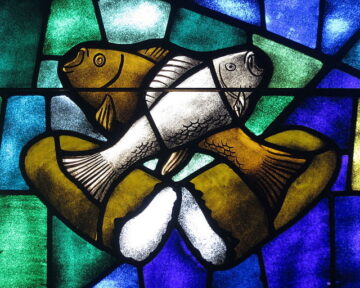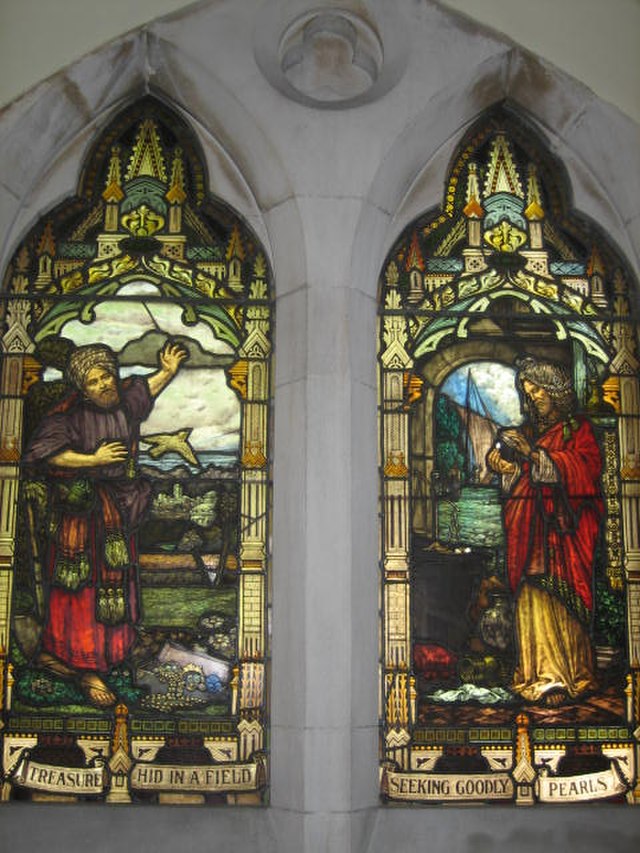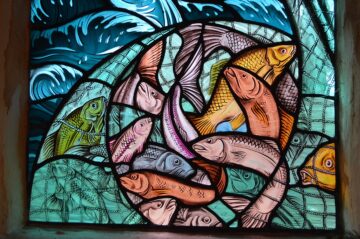Franciscan Friar Fr. Paul Gallagher reflects on the Gospel text for the Seventeenth Sunday of Ordinary Time. When have you had an experience of being overjoyed? When have you witnessed that experience in others?
The content is edited by Franciscan Sister of Christian Charity Sister Anne Marie Lom and Joe Thiel. The excerpts from the Sunday readings are prepared by Joe Thiel. To read or download the complete pdf with excerpts for your prayer, please click here Franciscan Gospel Reflection July 30 2023. Excerpts are from the Lectionary for Mass for Use in the Dioceses of the United States of America, second typical edition © 2001, 1998, 1997, 1986, 1970 Confraternity of Christian Doctrine, Inc., Washington, DC. Used with permission. All rights reserved. No portion of this text may be reproduced by any means without permission in writing from the copyright owner. Photos: Nheyob, CC BY-SA 4.0 <https://creativecommons.org/licenses/by-sa/4.0>, via Wikimedia Commons; Jules & Jenny from Lincoln, UK, CC BY 2.0 <https://creativecommons.org/licenses/by/2.0>, via Wikimedia Commons; StAnselm, Public domain, via Wikimedia Commons
Matthew 13:44-52
“The kingdom of heaven is like a treasure buried in a field, which a person finds and hides again, and out of joy goes and sells all that he has and buys that field.
Again, the kingdom of heaven is like a merchant searching for fine pearls. When he finds a pearl of great price, he goes and sells all that he has and buys it.
Again, the kingdom of heaven is like a net thrown into the sea, which collects fish of every kind. When it is full they haul it ashore and sit down to put what is good into buckets. What is bad they throw away.
Thus it will be at the end of the age. The angels will go out and separate the wicked from the righteous and throw them into the fiery furnace, where there will be wailing and grinding of teeth.
“Do you understand all these things?” They answered, “Yes.” And he replied, “Then every scribe who has been instructed in the kingdom of heaven is like the head of a household who brings from his storeroom both the new and the old.”
Background:
This week’s Gospel text, along with the text from the two previous weeks, has given the reader the opportunity to reflect on a block of Jesus’ parables that take up almost the entire 13th chapter of Mathew’s Gospel. These parables are addressed to the crowds that come to hear Jesus’ teaching. However, the explanation of the meaning of the parables is reserved for the disciples.
The three short parables that comprise the majority of the text for this week are all taken from familiar experiences of common people of the day – farmers, merchants and fishermen. The first two parables present the kingdom of God as a great treasure that is present but hidden to the non-observant, a theme that was hinted at by Jesus two weeks ago. When the disciples asked Jesus why he taught with parables, he responded: “This is why I speak to them in parables, because ‘they look but do not see and hear but do not listen or understand.’” (Matthew 13:13)
The parable about the kingdom being like a fisherman’s drag net is similar to the parable of the farmer who let the weeds grow along with wheat in his field until it was time to harvest. In both parables, Jesus says that angels will separate the wicked from the righteous in the final judgment.
The three parables of the Gospel for today also present three different ways that people discover or obtain the kingdom of God. In the first parable, the farmer finds a treasure in a field, which suggests an unexpected discovery. The farmer responds with joyful enthusiasm that would be considered reckless by most. If the farmer sells everything and the field does not produce a good harvest, the farmer is in danger of losing the field and the treasure. In the second parable, the merchant is diligently looking when the discovery of the great pearl occurs. The response to the discovery is equally as enthusiastic as the farmer in the first parable. The last parable speaks of those who are caught up in the kingdom without any awareness of what is going on. The kingdom is still present but they are unaware of its presence until the very end when they discover what has been caught. Some of the “catch” will be kept and some discarded. This parable echoes the theme of the over-generous action of God that was present in the parable of the sower that was first in this group of parables. (Matthew 13:1-9)
These parables present a picture of God who is at work establishing the kingdom. They include men and women, those who till the soil, merchants, and fishermen. God’s kingdom is discovered by those who are diligent in its pursuit, those who seem to stumble upon the kingdom almost by accident, and those who are caught in the kingdom as if by a large net with good and bad in it together. As a group, the parables present an image of God who is extravagant in God’s desire to bring the ordinary people of Jesus’ day to the kingdom. His message would be welcomed, greeted with enthusiasm, and stand in contrast to the teachings of the religious leaders of his day.
Reflection Questions:
- When have you had an experience of being overjoyed? When have you witnessed that experience in others?
- What about your image of the kingdom of God would lead you to feeling overjoyed?
- How would you complete the line: “The kingdom of God is like…?”
- Do you know people who really seem to be seeking the kingdom of God? What is it about them or their behavior that leads you to that assumption?
- Have you experienced the awareness that you have been treasuring the wrong things?
- Having reflected on the parables for the last three weeks, how would you describe Jesus’ desire?
- Can you take some time now to respond to God whose kingdom is revealed in the parables?




